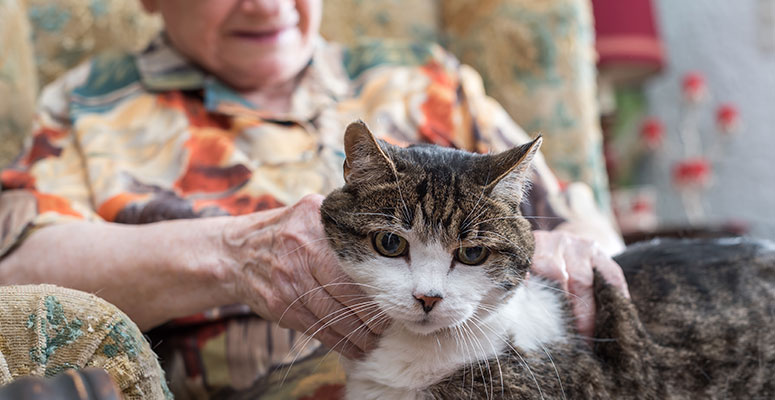
How Animals Can Help People with Dementia
In addition to becoming a member of the family, pets provide many benefits such as reducing stress, stabilizing blood pressure, and having another heartbeat in the house. In addition to improving emotional and physical health, pets can also help people with dementia lead happier, healthier lives.
Admittedly, it sounds counterintuitive at first to allow someone with dementia to feed and care for a pet. However, studies have shown that most people with dementia respond positively to having a pet in the house and if you follow a few guidelines, letting them keep a pet may be one of the best things you can do for them.
Can They Keep a Pet?
That depends on several factors and in-part whether they have a pet at the time they are diagnosed with dementia. Once the diagnosis has been made, it should be determined whether they can keep the pet or not by the following guideline.
Living Alone: If they live with you or someone who does not have dementia and can help take care of the pet, then they should be allowed to keep them. If they live alone and have had the pet for a while, then you will need to make a judgment call based on other factors.
Dogs & Cats: Dogs and cats have been pets for thousands of years and provide what most people with dementia need as a companion. They provide love and companionship unlike other animals, fish, or birds. Basically, pets that are high-maintenance and need a lot of care and attention are probably not well-suited for staying in the home, at least not in the long-term.
Early or Late Stages: A person in the early stages of dementia that is under a doctor’s care and is taking the prescribed medication should in most cases keep their pet. This is because in the early stages most adults continue to function almost normally and whatever slippage is usually temporary and not harmful to the pet.
If the loved one is reaching the late stages of dementia, then they should not have a pet in the home unless someone else is present. Usually at this stage, the person is taken to a care facility or has someone caring for them 24/7.
Do They Want the Pet?
This is an important question because if they no longer feel that they can properly take care of the pet or that someone else can do a better job, then you should respect their wishes. Hopefully, their decision will not be a knee-jerk one in reaction to hearing the diagnosis. In that case, you will want to talk to them about the importance of keeping a beloved pet and that only when they are no longer able to care for them should they be moved from the home.
Still, if the loved one with dementia no longer wants the pet in the home, then a new home should be found for the pet. This will not be an easy decision, but a pet can only do good in the home if it is wanted by the owner.
Contact PSC Community Services for more information. Please reach out to us directly at 718-389-7060 or info@psccs.org
